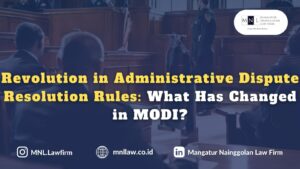
Minerba One Data Indonesia (MODI) is an application issued by the Directorate General of Mineral and Coal of the Ministry of Energy and Mineral Resources of the Republic of Indonesia (Ditjen Minerba) for managing and supervising business activities in the mineral and coal (minerba) sector. Every minerba business actor is required to be registered in the MODI system in order to access essential services from Ditjen Minerba related to production operations, sales, tax payments, license extensions, and so forth.
If a minerba business actor is not registered in the MODI system, which contains the List of Companies from the Structuring of Mining Business Permits (IUP) and Special Mining Business Permits (IUPK) that comply with the provisions as referred to in Article 54 paragraph (3) of the Regulation of the Minister of Energy and Mineral Resources of the Republic of Indonesia Number 26 of 2018 concerning the Implementation of Good Mining Practices and the Supervision of Mineral and Coal Mining, then such a minerba business actor will not receive licensing services in mining activities. As a result, their mining operations will come to a halt. Considering the importance of MODI for the sustainability of mining businesses, disputes frequently arise when Ditjen Minerba rejects or leaves unprocessed the MODI registration applications of mining companies, often leading to litigation, particularly when applications receive no response or follow-up. In this regard, the Supreme Court of the Republic of Indonesia has provided guidelines for resolving MODI-related disputes in court.
On December 17, 2024, the Supreme Court issued Circular Letter Number 2 of 2024 concerning the Enforcement of the Results of the 2024 Supreme Court Plenary Chamber Meeting as Guidelines for the Implementation of Duties by Courts (SEMA 2/2024). Page 10 of SEMA 2/2024, under point E.2., section “Results of the Administrative Chamber Meeting,” essentially states that the silence of an Administrative Body or Official who does not include or grant the Plaintiff’s application in the MODI list cannot be regarded as a factual act of omission, but rather as an act of refusal to issue an Administrative Decision under Article 3 of Law Number 5 of 1986.
SEMA 2/2024 changes the dispute resolution mechanism regarding MODI in the Administrative Court, which previously could be settled through two (2) possible mechanisms, namely:
(a) A Positive Fictitious Application based on Article 53 of Law No. 30 of 2014 and Supreme Court Regulation (PERMA) No. 8 of 2017; or
(b) A Factual Act Lawsuit based on Article 1 point 8 and Article 87 of Law No. 30 of 2014 as well as PERMA No. 2 of 2019.
However, with the issuance of SEMA 2/2024, MODI-related disputes filed by business actors whose MODI registration applications did not receive a response from the competent government authority must now be submitted through the Negative Fictitious Lawsuit mechanism under Article 3 of Law No. 5 of 1986.
Consult your legal issues regarding your MODI registration. The MNL Law Firm team is ready to assist you in handling MODI disputes at the Administrative Court.
Legal Basis:
-
Regulation of the Minister of Energy and Mineral Resources No. 26 of 2018 on the Implementation of Good Mining Practices and Supervision of Mineral and Coal Mining
-
Law No. 5 of 1986 on the Administrative Court
-
Law No. 30 of 2014 on Government Administration
-
Supreme Court Regulation (PERMA) No. 8 of 2017
-
PERMA No. 2 of 2019
-
Supreme Court Circular Letter (SEMA) No. 2 of 2024 on the Enforcement of the Results of the 2024 Supreme Court Plenary Chamber Meeting
Writer & Editor :
- Muhammad Arief Ramadhan, S.H.
